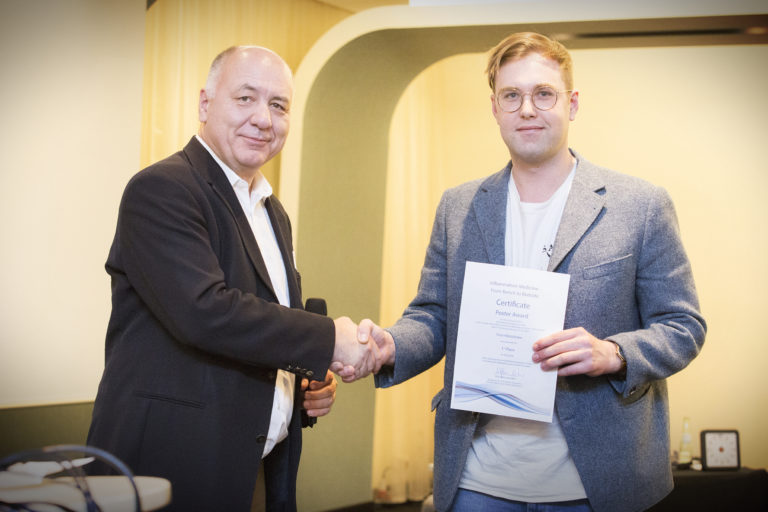11/2025: Disputation Finn
Today (19.11.2025), Finn successfully defended his PhD thesis with distinction after handing in his dissertation in early 2024. It was a pleasure to recap this awesome project, and Finn did really great as always. Your contributions were essential for the development of the entire group’s research focus and I’m very happy to have had you in the team. Finn will continue his research as clinician scientist at University Hospital Schleswig Holstein (UKSH) Kiel with Philip Rosenstiel and Stefan Schreiber. Best of luck and huge congratulations Finn – very well deserved!
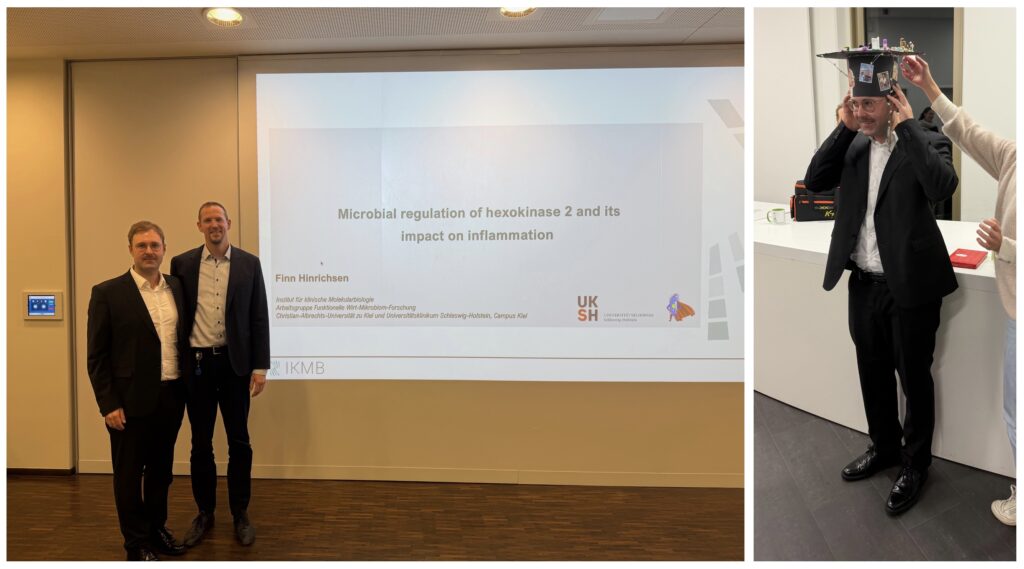
10/2025: Collaboration article published in Cell Reports
Great collaborative work on how multi-strain probiotic supplementation influenced the gut microbiome and metabolome in very-low-birth-weight infants at high risk of late-onset sepsis led by Silvio Waschina, Julia Pagel and Christoph Härtel of Kiel University, University Medical Center Hamburg-Eppendorf and University of Würzburg with contributions from University of Lübeck and Max Planck Institute for Evolutionary Biology Plön has been published in Cell Reports. Huge congratulations to everyone involved!
Main findings are that:
• Multi-strain probiotics modulate gut colonization in preterm infants.
• Probiotic use reduces gut pathobionts linked to antibiotic resistance.
• Late-onset sepsis is associated with lower lactate and acetate levels.
• Metabolite signatures may aid early risk stratification for neonatal sepsis.
We contributed to the NGS-based microbiome analyses.
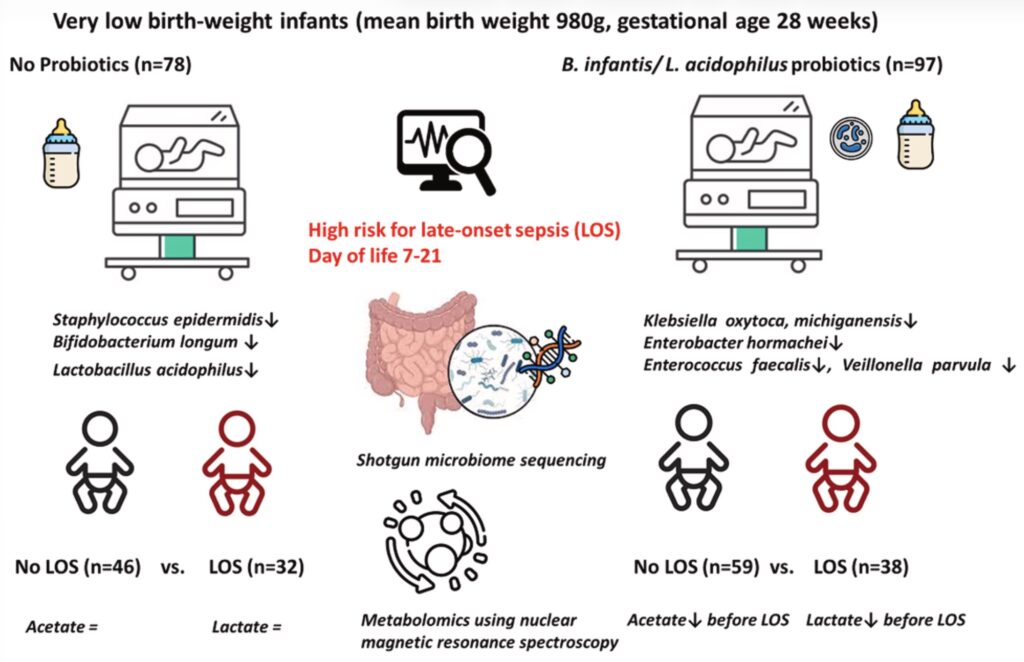
Graphical abstract from https://doi.org/10.1016/j.celrep.2025.116431
10/2025: Lea receives the “Kiel Oncology Young Investigator Award”
Great way to end the week:
Today the „Young Researchers in Oncology“ event took place at the Karl-Lennert-Cancer-Center at Universitätsklinikum Schleswig-Holstein moderated by Prof. Susanne Sebens. The event celebrated this year’s graduates of the “Certificate Program in Oncology” who received their certificates. Congratulations to all the young oncology scientists!
The cherry on top was that Lea Järke received the “Kiel Oncology Young Investigator Award” in the category medical scientists) for her scientific achievements during her doctoral thesis and the publication of the data in the article “Deletion of epithelial HKDC1 decelerates cellular proliferation and impairs mitochondrial function of tumorous epithelial cells thereby protecting from intestinal carcinogenesis” in the journal “Cancer Communications” (www.dx.doi.org/10.1002/cac2.70022).
Congratulations, Lea – well deserved! Looking forward to move this topic forward with you and everyone involved!
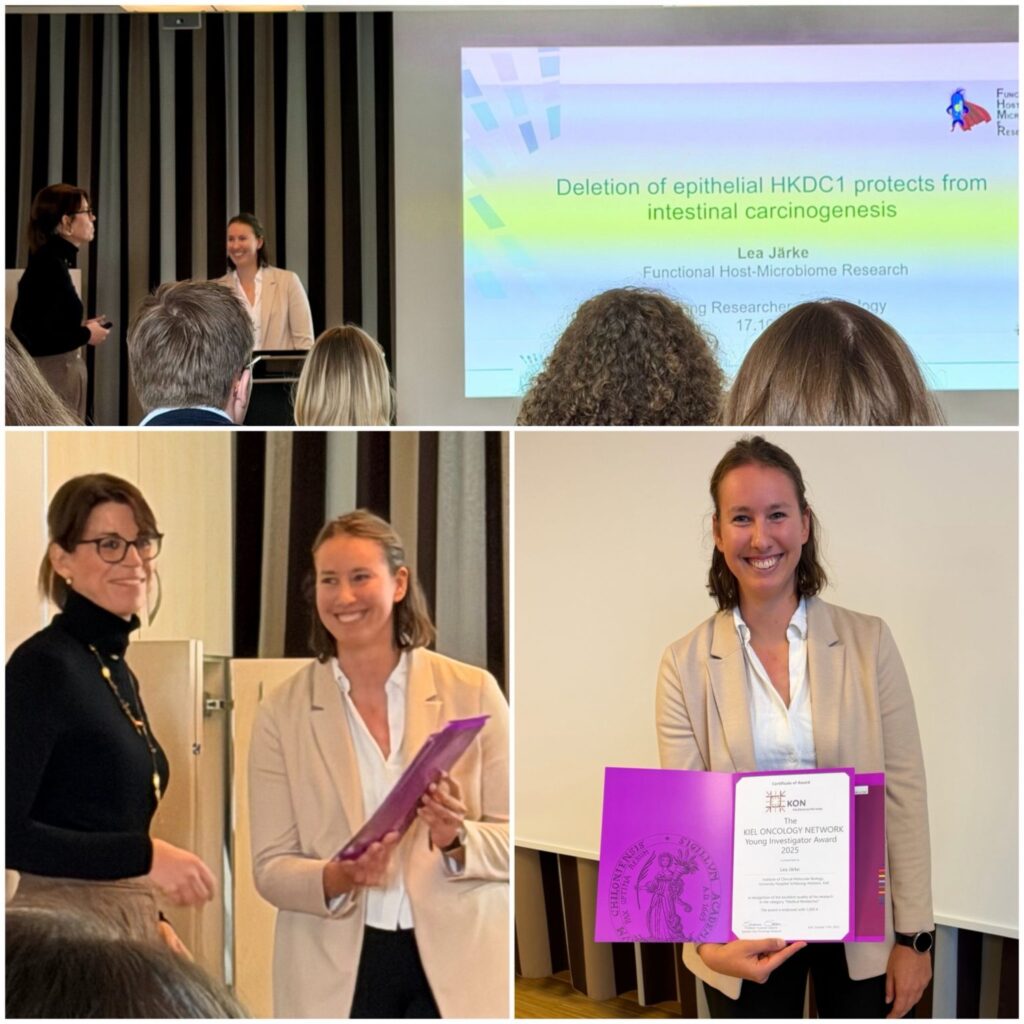
08/2025: Cover image
We made the cover of the current Cancer Communications Volume 45, Issue 7!
Big thank you especially to Katja Duwe-Schrinner (IKMB) for designing the cover!
Link: https://onlinelibrary.wiley.com/doi/10.1002/cac2.12563
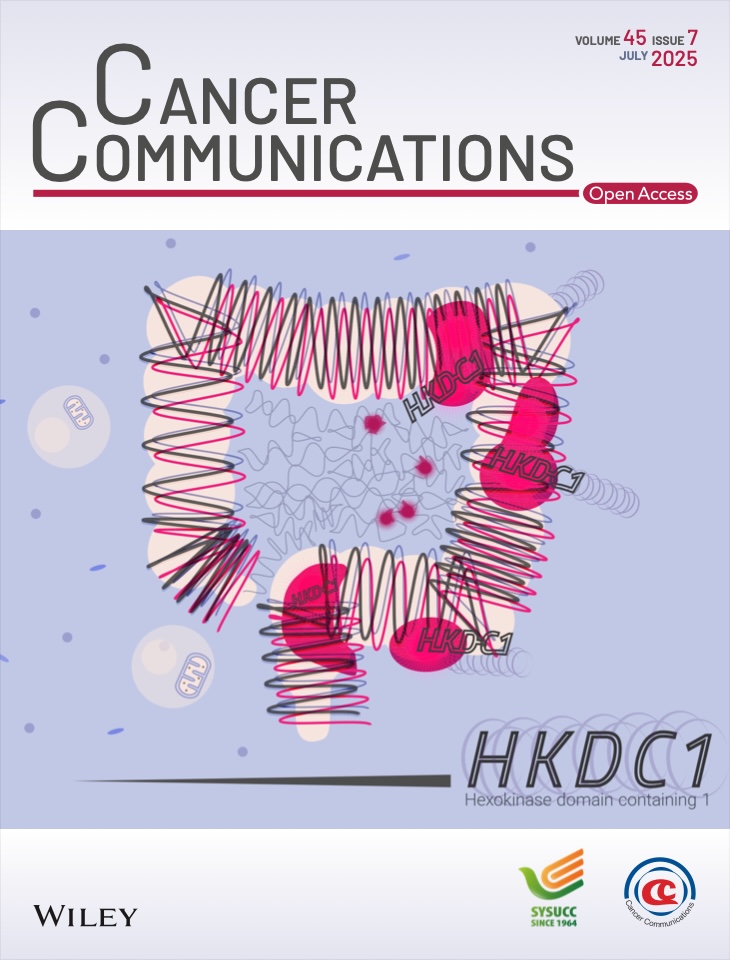
07/2025: Group BBQ
Science is important, yet social life is equally essential. We were very lucky with the weather (no rain, just before & after) and had a great BBQ outing with the group. Looking forward to the next occasion!
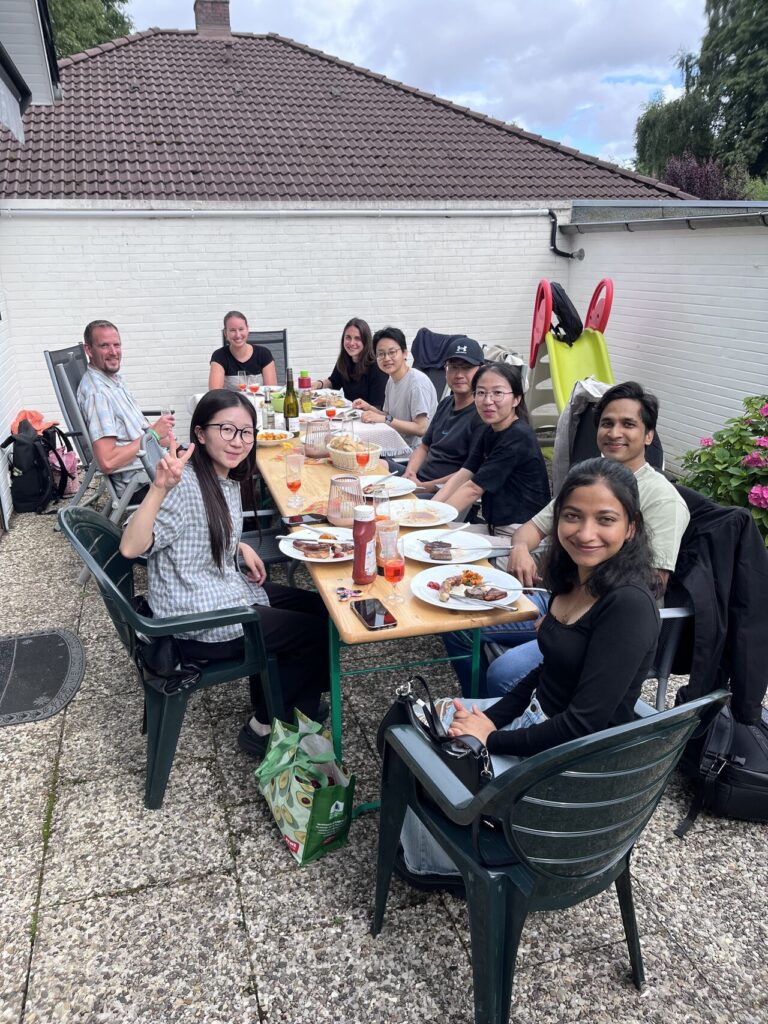
07/2025: Precision Oncology
Shoutout to the organizers and colleagues of the Precision Oncology workshop this Tuesday in Lübeck. Great presentations and discussions that also led to new exciting collaborations. Looking forward to what the next weeks and months will hold.
Image credit and organization to the University Cancer Center Schleswig-Holstein (UCCSH) with Dr. Sarah Habig
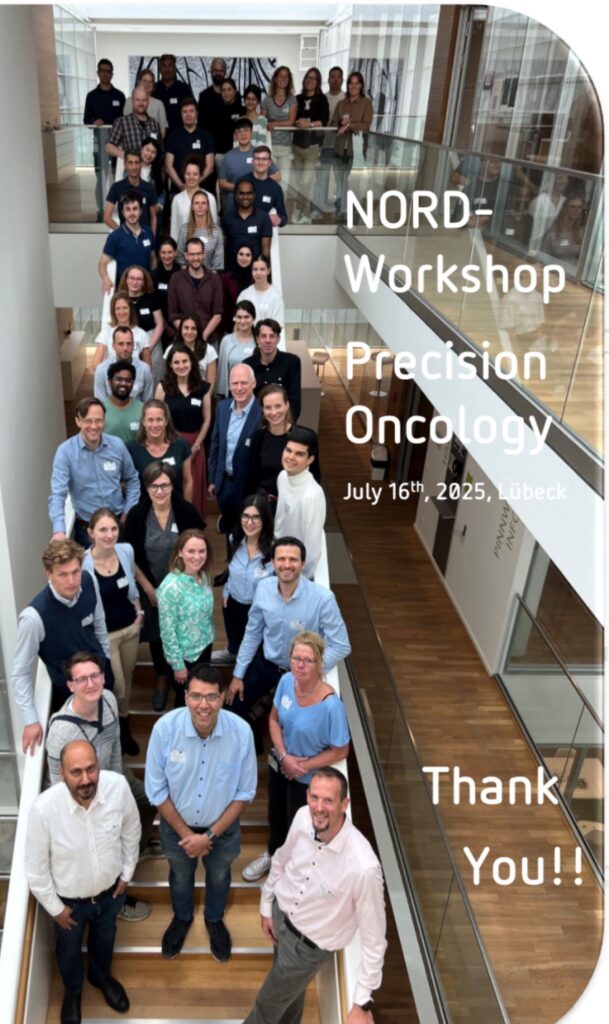
05/2025: New publication: role of DUOX2 for proper mucus establishment
Happy to see another collaboration project led by George Birchenough of Gothenburg University (Sweden) published in Journal of Experimental Medicine demonstrating the importance of epithelial DUOX2: we find that proper development of the colonic mucus layer and functional sentinel goblet cells, which are pivotal in providing protection from infection and inflammation, is controlled by the intestinal microbiota by triggering host innate immune signaling via MyD88 and the NADPH/dual oxidase family member DUOX2 early in life during postnatal development.
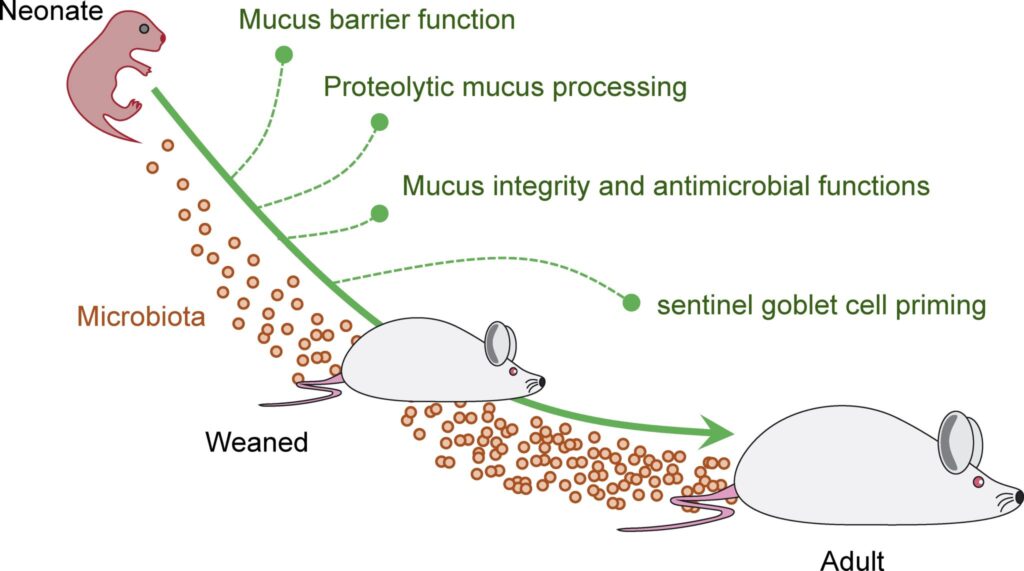
04/2025: New publication: microbiome-rejuventation therapy
Happy to share another functional microbiome study that Prof. Philip Rosenstiel (ICMB, Kiel University) and I initiated already way back in 2016, which finally came to a conclusion today (02.04.2025) with the publication in Microbiome.
This project grew and got bigger and bigger every year. Big thank you to all collaboration partners of the @Kaleta_Lab and @Rosenstiel_Lab!
By performing a microbiome-therapy in a gnotobiotic mouse model and using a variety of functional assays we discovered that microbiome rejuvenation slightly expanded life expectancy and improved motor coordination and intestinal permeability. Molecular analyses including 16S rRNA gene profiling, metagenomics, single‐cell RNA sequencing and metabolic modelling revealed beneficial metabolic and immunological profiles in both the microbiome and host with, for example, fewer encoded pro‐inflammatory factors and more stable ecological interactions. Together, our data show that, indeed, life‐long and repeated transfer of microbiota material from young individuals improved age‐related processes, thus highlighting the potential of microbiome-based anti-aging therapies.
Link: https://microbiomejournal.biomedcentral.com/articles/10.1186/s40168-025-02089-8
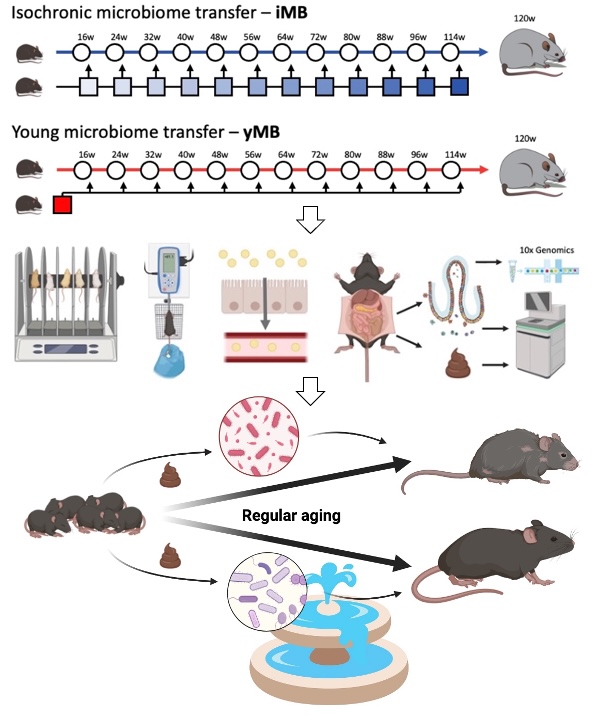
Created using Biorender]
03/2025: New publication – host-microbiome interactions during aging
Excited to share that a collaboration project lead by Prof. Christoph Kaleta (IEM, Kiel University) on the cross-species metabolic exchange between microbiome and host during aging has just been published in Nature Microbiology (26.03.2025).
Big thank you to everyone involved including @Kaleta_Lab, @Frahm_Lab, @Baines_Lab, @Rosenstiel_Lab and Schmitt-Kopplin_Lab!
In this collaborative effort, we find that metabolic activity of the microbiome declines with aging along with beneficial interactions not only between bacteria but also with the host. Together, our results elucidate microbiome-host interactions potentially influencing host aging processes, which could serve as future targets for the development of microbiome-based anti-aging therapies.
Stay tuned – more on the topic of microbiome and aging will follow very soon!
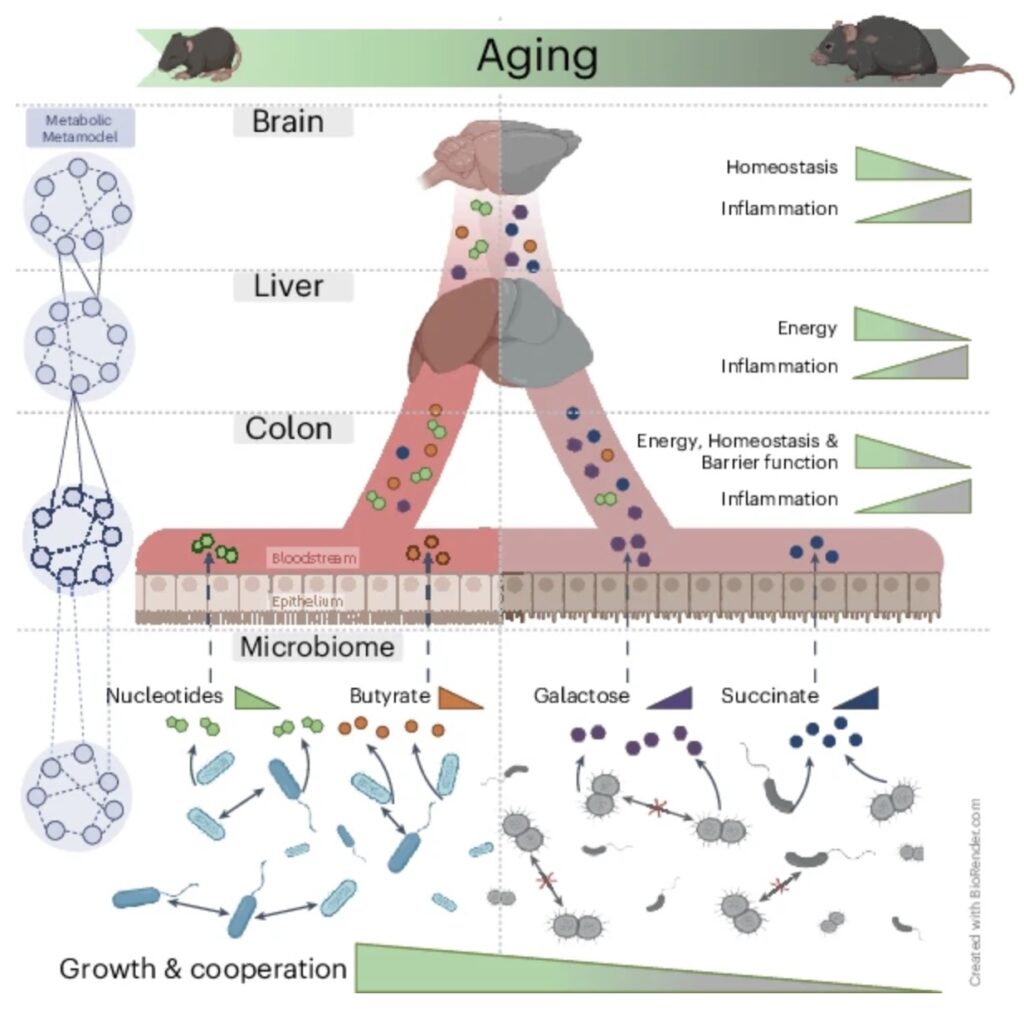
[Image “Ext. Data Fig. 7” from article, created using Biorender]
03/2025: New publication altert – HKDC1 deletion protects from intestinal carcinogenesis
A new lab study lead by the two talented PHD students Lea Järke and Saskia Weber-Stiehl has now been published (20.03.2025) in Cancer Communications.
Big thank you to everyone involved including @Rosenstiel_Lab, Rupp_Lab, @Kaleta_Lab, @Tholey_Lab and @Röcken_Lab!
So proud and happy how this turned out:
We find that deletion of the unconventional hexokinase HKDC1 alters various hallmarks of cancer cells including proliferation, cell death and mitochondrial metabolism, and thereby protects from intestinal carcinogenesis. These findings are exciting because they highlight a new way to treat colon cancer. Stay tuned – hopefully more to come soon!
Link: https://onlinelibrary.wiley.com/doi/full/10.1002/cac2.70022
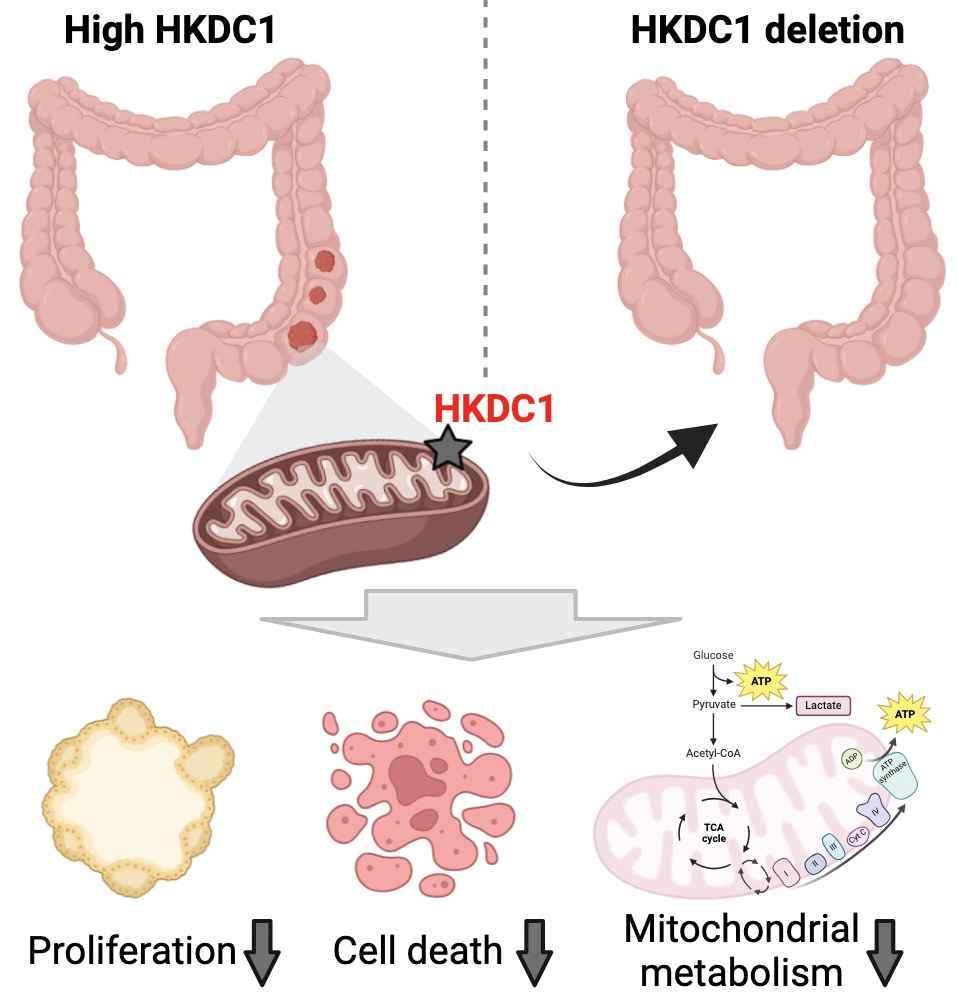
[Image created using Biorender]
12/2024: Ending 2024 with a bang
After almost 2 years of evaluation time since handing in his dissertation, Jacob finally was allowed to perform his disputation of this PhD thesis. Jacob finished strong (as usual) and can now fully focus on his new projects as clinician scientist at The University Medical Centre Göttingen in the Clinic for Gastroenterology, Gastrointestinal Oncology and Endocrinology. Huge congratulations, Jacob – well done! I’m very proud of you and happy to have had you in the lab!
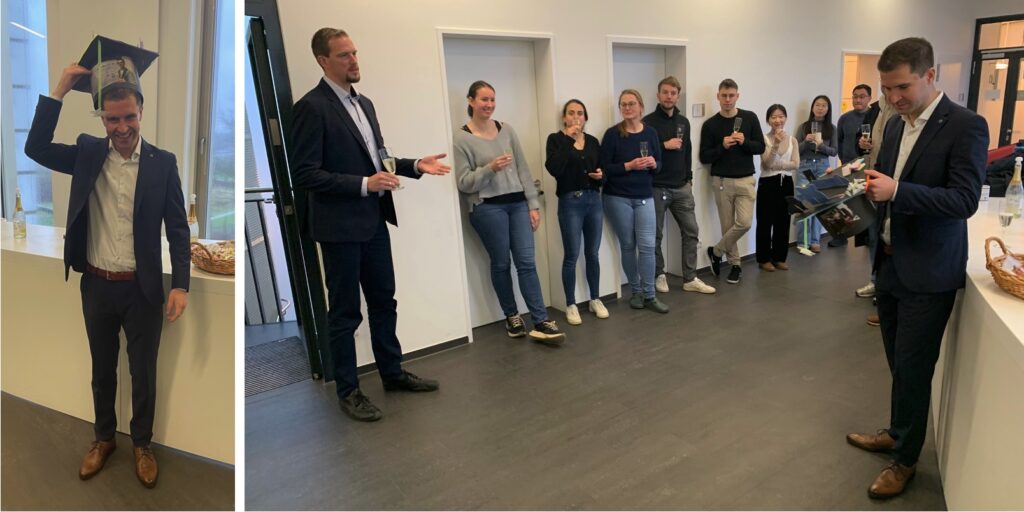
10/2024: HK2 is a biomarker for intestinal inflammation
Analysing paired RNA-seq gene expression and clinical inflammation score data we found that apical epithelial HK2 expression gradually increases with inflammation severity, thus placing HK2 as a biomarker for intestinal inflammation and suggesting it as a therapeutic target in IBD. This collaborative project together with the Kaleta lab, and the clinicians Christoph Röcken, Stefan Schreiber, Konrad Aden and Philip Rosenstiel was published today (23.10.2024) in BMC Medicine. Big thank you to everyone involved!
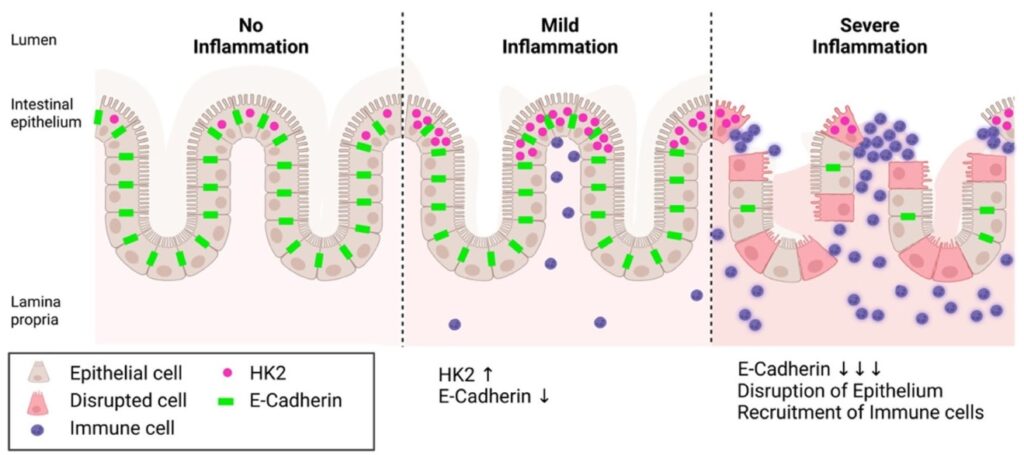
09/2024: Findings published in Nature!
A great collaboration project led by Minoru Takaoka and Ziad Mallat of Cambridge University was published today (04.09.2024) in Nature. Huge congratulations to everyone involved and thanks for including us in the project! We mainly contributed microbiome analyses.
This study found that yo-yo dieting of a western diet accelerated cardiovascular disease by reprogramming the immune system, in particular macrophage function, which, surprisingly, was mostly independent of microbiome changes.
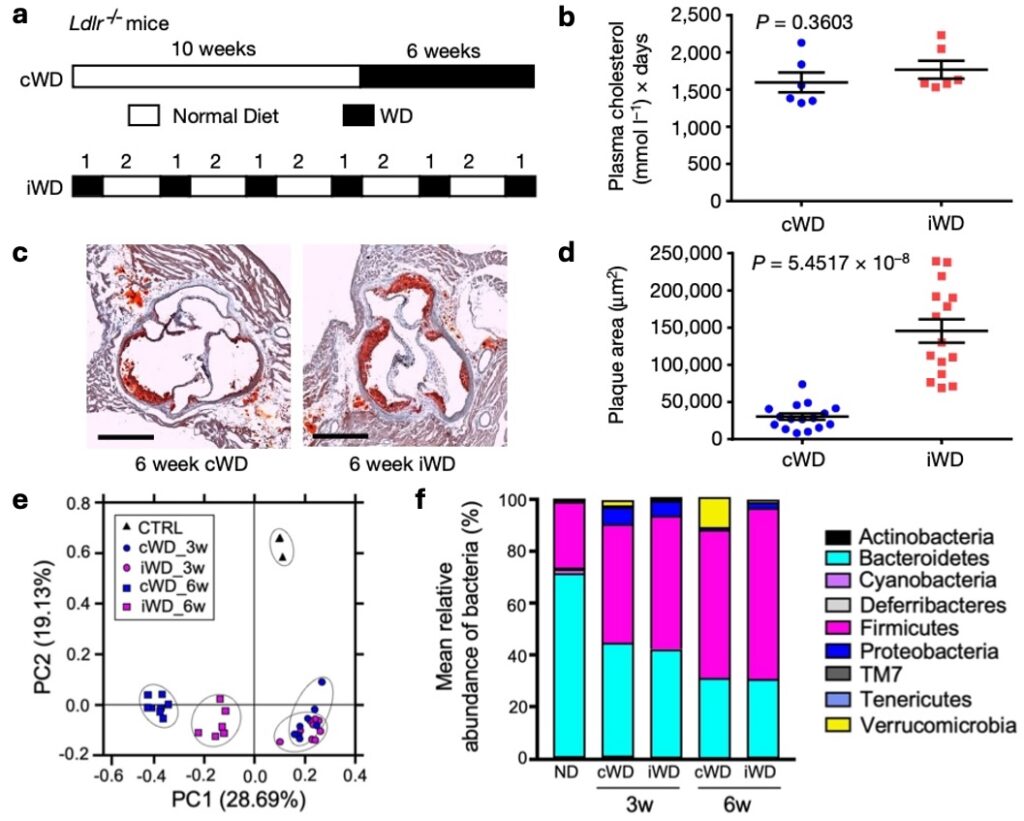
10/2023: DUOX2-microbiome manuscript published!
An 8-year-long endeavor finally came to a conclusion: DUOX2-produced reactive oxygen species (ROS) control intestinal microbiome composition and its epithelial deletion protects from experimental colitis in mice. In humans, IBD patients with high DUOX2 expression display a dysbiotic microbiome. Therefore, dysregulated DUOX2-microbiome interactions associate with intestinal inflammation in both mice and humans.
Big thank you to everyone contributing to this project including but not limited to:
Juan Camilo Castrillón-Betancur
Víctor Alonso López-Agudelo
Nina Sommer
Sven Cleeves
Joana Pimenta Bernardes
Saskia Weber-Stiehl
Philip Rosenstiel

04/2023: Finally: Setting up of gnotobiotic isolators!
With almost 1.5 years delay due to very long production & delivery times of the ordered equipment, required reconstructions in the animal house to harbor the huge isolator stands and training of personal, today (19.04.2023) finally the first CBC flexible film breeding isolator was build up. Up next: SOP testing! Hopefully more to come soon…
Last but not least: huge thank you to Gerhard Schultheiß, Philip Rosenstiel and John Baines for their support in getting this facility for Kiel and of course also to the UKSH and CAU medical faculty for funding the facility!
#gnotobiotics #microbiome

04/2023: Zeynep receives Master degree
Today (13.04.2023) Zeynep successfully defended her thesis work in the Master of Science program Infection Biology at Lübeck University. Congratulations Zeynep!
Zeynep’s Master thesis focussed on infections with the pathogen Citrobacter rodentium both in vivo but also in various in vitro models (cell lines and intestinal organoids).
Thank you to Jan Rupp from Lübeck University for supporting and supervising Zeynep’s thesis!

03/2023: Collaboration article published in Immunology
Great work led by Jinzhi Duan and Richard Blumberg of Harvard Medical School was published today (07.03.2023) in Immunology. This was quite a ride and long endeavor but it all ended awesome. Huge congratulations to everyone involved! We mainly contributed conditional DUOX2 mice and Citrobacter infections.
Abstract: Intestinal IL-17-producing T helper (Th17) cells are dependent on adherent microbes in the gut for their development. However, how microbial adherence to intestinal epithelial cells (IECs) promotes Th17 cell differentiation remains enigmatic. Here, we found that Th17 cell-inducing gut bacteria generated an unfolded protein response (UPR) in IECs. Furthermore, subtilase cytotoxin expression or genetic removal of X-box binding protein 1 (Xbp1) in IECs caused a UPR and increased Th17 cells, even in antibiotic-treated or germ-free conditions. Mechanistically, UPR activation in IECs enhanced their production of both reactive oxygen species (ROS) and purine metabolites. Treating mice with N-acetyl-cysteine or allopurinol to reduce ROS production and xanthine, respectively, decreased Th17 cells that were associated with an elevated UPR. Th17-related genes also correlated with ER stress and the UPR in humans with inflammatory bowel disease. Overall, we identify a mechanism of intestinal Th17 cell differentiation that emerges from an IEC-associated UPR.
Link to the article.

10/2022: Collaboration article published in Nature Communications
After years of hard work, results from the PhD thesis of Antonella Fazio and Dora Bordoni from the Systems Immunology lab (Philip Rosenstiel) were finally published in Nature Communications. Huge congratulations to everyone involved and especially Antonella, Dora and Philip.
Saskia, me and other lab members supported throughout the work but especially during the microbial analyses (FISH & 16S qPCRs).
Abstract: Genetic variants in the DNA methyltransferase 3 A (DNMT3A) locus have been associated with inflammatory bowel disease (IBD). DNMT3A is part of the epigenetic machinery physiologically involved in DNA methylation. We show that DNMT3A plays a critical role in maintaining intestinal homeostasis and gut barrier function. DNMT3A expression is downregulated in intestinal epithelial cells from IBD patients and upon tumor necrosis factor treatment in murine intestinal organoids. Ablation of DNMT3A in Caco-2 cells results in global DNA hypomethylation, which is linked to impaired regenerative capacity, transepithelial resistance and intercellular junction formation. Genetic deletion of Dnmt3a in intestinal epithelial cells (Dnmt3aΔIEC) in mice confirms the phenotype of an altered epithelial ultrastructure with shortened apical-junctional complexes, reduced Goblet cell numbers and increased intestinal permeability in the colon in vivo. Dnmt3aΔIEC mice suffer from increased susceptibility to experimental colitis, characterized by reduced epithelial regeneration. These data demonstrate a critical role for DNMT3A in orchestrating intestinal epithelial homeostasis and response to tissue damage and suggest an involvement of impaired epithelial DNMT3A function in the etiology of IBD.
Link to the article.

06/2022: Perspective published in Frontiers in Microbiology
Energy and anabolic metabolism are essential for normal cellular homeostasis but also play an important role in regulating immune responses and cancer development as active immune and cancer cells show an altered metabolic profile. Mitochondria take a prominent position in these metabolic reactions. First, most key energetic reactions take place within or in conjunction with mitochondria. Second, mitochondria react to internal cues from within the cell but also to external cues originating from the microbiota, a vast diversity of associated microorganisms. The impact of the microbiota on host physiology has been largely investigated in the last decade revealing that the microbiota contributes to the extraction of calories from the diet, energy metabolism, maturation of the immune system and cellular differentiation. Thus, changes in the microbiota termed dysbiosis have been associated with disease development including metabolic diseases, inflammation and cancer. Targeting the microbiota to modulate interactions with the mitochondria and cellular metabolism to delay or inhibit disease development and pathogenesis appears an attractive therapeutic approach. Here, we summarize recent advances in developing the therapeutic potential of microbiota-mitochondria interactions for inflammation and cancer.
Link to our perspective.

05/2022: Mini-Symposium “Host-Microbiota Interactions in Health and Disease”
Christoph Reinhardt organized a great Mini-Symposium on “Host-Microbiota Interactions in Health and Disease” at a beautiful historic place: the Ebernburg in Bad Münster am Stein. It was really awesome to meet long-standing and new friends of the microbiome and gnotobiotics field. Talks were excellent and the evening activities (wine tasting with food on a boat) were just plain awesome!
Big thank you to everyone involved and of course to the organizers!

01/2022: Perspective published in Science
Today, Friday, January 28th, Science provided Fredrik Bäckhed and me with the great opportunity to present a short perspective on a beautiful article by Regan and colleagues published in the same issue on hibernating squirrels and how the microbiota helps them to sustain protein homeostasis during prolonged fasting and inactivity.
In very brief: During inactivity muscle proteins are broken down yielding ammonium, which is then converted to urea and normally is excreted via urine and lost. Thus, nitrogen levels need to be replenished through dietary uptake. Despite the lack of regular food intake, hibernating mammals overcome this issue by transporting urea into the gut lumen instead making it available to the intestinal bacteria, which have enzymes (ureases) that metabolize urea into carbon dioxide and ammonium. The ammonium is then used again by bacteria to produce amino acids, some of which are finally absorbed by the host and can be used to make new proteins.
These findings have potential application to humans as well. Muscle wasting is prevalent in humans, for example during protein malnutrition, which affects millions of people worldwide, especially children in developing countries, but it is also prevalent in the elderly due to age-related muscle loss (sarcopenia). Moreover, prolonged inactivity as caused by hospitalizations or space travel also trigger muscle wasting. The molecular machinery for urea nitrogen salvaging (UNS) seems to be present in humans. Thus, pro- or prebiotic treatments targeting this urea nitrogen recycling process may be a promising approach to counteract muscle wasting.
Link to original article by Regan and colleagues.
Link to our perspective.

11/2021: HK2 manuscript published in Cell Metabolism!
A long journey finally made its way to publication. In a search for microbially regulated genes we identified hexokinase 2 (HK2) and other glycolytic regulators as greatly modulated by the microbiome. Glycolysis and hexokinase activity are critical for immune cell activation and HK2 is dysregulated in inflammation. We therefore sought out to investigate the role of HK2 in inflammation. Using genetic and gnotobiotic mouse models, we reveal that deleting epithelial HK2 protects against colitis by suppressing cell death and altering mitochondrial function. Further, the microbial metabolite butyrate downregulates HK2 via engaging the epigenetic regulator HDAC8, thereby providing protection from colitis. Our data therefore point towards targeting HK2 as a promising approach to treat intestinal inflammation.
Huge thank you to Jacob Hamm, Finn Hinrichsen and Magdalena Westermann for driving this important work but also to all collaborators (i.e. Kensuke Shima, Jan Rupp, Philippe Schmitt-Kopplin, Christoph Kaleta, Ruth Schmitz-Streit, Stefan Krautwald, Bärbel Stecher, Andrea Wolf and Fredrik Bäckhed) for each individual contribution! Special thank you also to Philip Rosenstiel for believing in this project and, of course, also to the DFG for providing funding for this project through the research group FOR5042, the research training group RTG1743 and the collaborative research center CRC1182. Finally, thank you to Cell Metabolism and the three unknown reviewers for a constructive process that improved manuscript. The article was published online on November 29th and is accessible at http://dx.doi.org/10.1016/j.cmet.2021.11.004

The image depicts a bacterium extinguishing a fire in the colon by spraying with butyrate to symbolize the beneficial impact on inflammation.
Image credit: Renate Nikolaus.
10/2021: Collaborative paper out in iScience!
A great collaboration with the lab of Christoph Reinhardt yielded yet another common publication:
“The gut microbiota instructs the hepatic endothelial cell transcriptome”
https://www.cell.com/iscience/fulltext/S2589-0042(21)01060-9
We find that:
• Germ-free mice show transcriptome differences in the liver sinusoidal endothelium
• Gut microbiota suppresses sphingolipid metabolism in the hepatic sinusoidal endothelium
• Cholesterol flux and angiogenesis in liver endothelium is microbiota-regulated
• Bacteroides thetaiotaomicron did not affect expression levels of the identified genes
Big thank you to everyone involved, especially Henning Formes, Joana Pimenta Bernardes & Christoph.

06/2021: Collaborative paper out in BMC Microbiology!
Finally, after a long journey a great collaboration with the groups Andre Franke and Burkhard Weiser paid of in a common publication:
“Short-term physical exercise impacts on the human holobiont obtained by a randomised intervention study”
https://bmcmicrobiol.biomedcentral.com/articles/10.1186/s12866-021-02214-1https://www.cell.com/iscience/fulltext/S2589-0042(21)01060-9
We find that:
Different types of exercise have distinct but moderate effects on the overall physiology of humans and very distinct microbial changes in the gut. The observed overall changes during the intervention highlight the importance of physical activity on well-being.
Big thank you to everyone involved!

01/2021: Celebration of PD Dr. Sommer!
On Thursday, January 28th, Felix finally completed his habilitation in Clinical Molecular Biology at the Medical Faculty of Kiel University by giving the lecture entitled “Microbiome-based therapy of chronic inflammation and malnutrition”, thereby receiving the venia legendi.
Due to the current restrictions, the entire procedure was carried out in an online format. A real celebration will follow as soon as possible!

10/2020: Paper published in Nutrients
Our article “Nutritional Targeting of the Microbiome as Potential Therapy for Malnutrition and Chronic Inflammation” is out now in Nutrients summarizing examples of microbiome-directed therapies and how these approaches may improve treatment success for inflammatory disorders.
https://www.mdpi.com/2072-6643/12/10/3032
https://dx.doi.org/10.3390/nu12103032
Especially happy for Lena & Sina for receiving their first primary authorships (equal contribution).
Thanks to everyone involved!


06/2020: Lena receives Master degree
After putting in some long and hard work Lena received her Master of Science degree in Medical Life Sciences from Kiel University.
Lena’s Master’s thesis focussed on the “Analysis of host-microbiota interactions during malnutrition” and was graded excellent (1.0).
Altogether Lena completed the Medical Life Sciences with an outstanding score (1.2).
Congratulations Lena!
Picture Copyright: Lena Schröder.

04/2020: Paper published in CMGH
So glad to finally see our story out in Cellular and Molecular Gastroenterology and Hepatology (CMGH): “NOD2 influences trajectories of intestinal microbiota recovery after antibiotic perturbation”
https://www.cmghjournal.org/article/S2352-345X(20)30044-8/fulltext
https://doi.org/10.1016/j.jcmgh.2020.03.008
Thank you so much to everyone involved!

03/2020: Funding acquired via RTG1743
We managed to acquire funding of 35k€ for 12 months from the RTG1743 to conduct a research plan aiming to further decipher the molecular alterations in mitochondrial function due to loss of hexokinase. This was a team effort of the RTG1743 PhD students mainly lead by Finn, Jacob & Lena and also included Katharina Koethke (Department of Infectious Diseases and Microbiology, UKSH Campus Lübeck), Arunabh Sharma (Institute of Medical Informatics and Statistics, UKSH Campus Kiel) and Anna Schaade (Institute of Clinical Molecular Biology, UKSH Campus Kiel) and the researchers Dr. Kensuke Shima & Dr. Florian Tran. Big thank and congratulations to everyone involved!
02/2020: Finn receives first price
Finn received the first price endowed with 500 € for his poster “Microbial regulation of epithelial hexokinase 2 links mitochondrial metabolism and cell death in colitis” at the International Cluster Symposium “Inflammation Medicine – From Bench to Bedside” of the Excellence Cluster EXS2167 “Precision Medicine in Chronic Inflammation” held in Hamburg February 17-18th, 2020. The project is a team effort involving also Jacob and Lena along with colleagues from Lübeck and Kiel. Congratulations to Finn and everyone involved!
Prof. Dr. Stefan Schreiber, speaker of the Excellence Cluster EXS2167 “Precision Medicine in Chronic Inflammation”, hands over the certificate on the first price to Finn Hinrichsen.
Pictures taken by C. Kloodt. Copyright: Excellence Cluster EXS2167, Kiel University.
Further information: https://www.precisionmedicine.de/de/02-symposium

